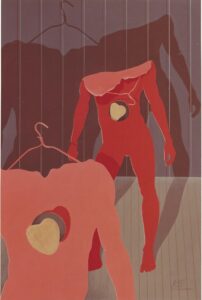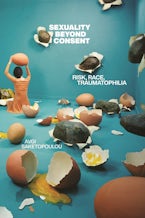I have nothing to say about President Claudine Gay’s resignation except that Harvard is a terrible place and I feel sorry for anyone who works there.
Writer, AIDS activist, and historian Sarah Schulman was interviewed last month by Sally Tamarkin in the queer magazine THEM. Among other points, Schulman discussed what supporters of Palestinian human rights can learn from ACT UP about allowing differences of opinion in liberation movements. Schulman’s books include Israel/Palestine and the Queer International and Conflict Is Not Abuse.
In Israel/Palestine you talk about the “absurdities and promise” of politics of solidarity. What are your observations about solidarity politics today, in the 10-plus years since you wrote the book?
I think there’s a fake fantasy of solidarity that is like the rainbow: one of you, and one of you, and we’re all happy and we all look alike and we’re all together, and that’s really not what it is. It’s a fraught and constantly shifting series of relationships. And as much as it is a fantasy, it is also an absolute necessity because at least in the United States, change only comes from coalition, and if you’re out there on your own, you cannot transform the society…
I’m wondering if you think about this balance between being able to have plurality and connect around where we differ, but also making sure that we’re not sliding back into, “well, just some reforms would be okay,” if what we really want is liberation.
ACT UP had a radical democracy structure in which people were allowed to disagree and they could function in separate spheres as long as they adhered to the one-sentence statement of unity, which was “direct action to end the AIDS crisis.” If you were doing direct action to end the AIDS crisis, really you could do anything. And the key to ACT UP was that they did not try to force homogeneity of analysis or strategy. Instead, there was simultaneity. So it’s not about compromise, it’s about coexistence — or as the Palestinians call it, co-resistance.
Right now, there are people who want a ceasefire, and then there are people who want to end U.S. funding, and then there are people who want a one-state [solution], and then there are people who want a return to the Palestinian state. There are a lot of different wants, and you have to figure out where you are in this moment and go with what makes sense to you. It’s not about telling people who want to ceasefire that they’re wrong; that is not helpful because we do need to ceasefire. Nothing can happen as long as people continue to be murdered.
There are those of us who want to end the occupation and siege, and we do everything we can toward that goal. But it’s not about trying to take down the other positions that are on your spectrum. This is the great error of the left. And this is where a lot of people make a mistake about what they think activism is; they think that activism is about taking people down if you don’t have full agreement, and that is wrong. Activism is about opening a door that makes it possible for people to be effective where they’re at.
Lesbian-feminist playwright Carolyn Gage’s blog post “A Note To My Friends Who Are Frustrated With My Political Process” applies her expertise in trauma recovery to the heated debate about Gaza and the feelings of powerlessness it inspires. Everyone, from the richest university in America to the most obscure poetry journal, faces political pressure to make a public statement immediately, which is hardly conducive to what Buddhists call right speech–true, timely, compassionate, and beneficial.
In her concluding remarks in the novel Uncle Tom’s Cabin, Harriet Beecher Stowe took up the question regarding abolition that was on so many white people’s lips, “What can I do?” This is what she wrote:
“But what can any individual do? Of that, every individual can judge. There is one thing that every individual can do—they can see to it that they feel right.” [her emphasis]
I find myself thinking about this challenge, and her emphasis, during the bombing and invasion of Gaza…
…the first thing that comes to me is to search out a wide range of perspectives on the situation. For me, that means to read the Arab world press and the Israeli press, and to read these publications across the right wing, moderate, and liberal spectrum. It means to seek out the opinions of the political leaders in my own country who have earned my respect for decades—and, sadly, they are a precious few.
It also means listening to my friends who are often expressing themselves with unfiltered rage, grief, and alarm and from every conceivable point of view. It means listening to friends who are triggered, who are in post-traumatic states. It means listening to friends who are absorbing and responding to horrific propaganda. It means listening to dissociation, demonization, dehumanization, projection, denial, and selective amnesia. It means maintaining compassion in the face of verbal abuse. It means being wildly misunderstood and developing the algorithms for determining where, when, and how it might be productive to attempt to make myself understood.
Dr. Marc Lamont Hill is a social justice organizer and a professor at the City University of New York Graduate Center, where he teaches anthropology, urban education, and Middle Eastern studies. He has a very engaging YouTube channel where he gives pithy analysis of the Palestinian situation, as well as videos on current events and Black popular culture. I learned a lot from this 11-minute video on “5 Myths About Israel and Palestine”.
Karim Kattan, a Jerusalem-born French novelist, wrote about the silencing of Palestinian voices in an October 2023 essay in The Baffler, “At the Threshold of Humanity”.
Three weeks ago, in a world that was significantly different from today, I was preparing a keynote speech. I had been invited to talk about my work in Innsbruck, in Austria, at a conference on the French language across borders. Following the Hamas attack on October 7, I received a message from the organizers demanding that I share the title of my speech and that I “refrain from mentioning the current situation and leave the political dimension out of [my] talk to avoid any eruption.” I responded that I could not participate under these conditions, my whole practice and life being at stake in what is unfolding in my country. The organizer insisted on calling me so that she could explain that “the current situation”—a euphemism—seemed very confusing and complicated to her, possibly a minefield, and therefore they just wanted to make sure that what I said was appropriate. “I realize,” she added, “that you wouldn’t say anything horrific. I just want to make sure.”
I have been thinking about this conversation in the weeks since, about what it says of the way we Palestinians are considered as living, breathing, writing, political beings. That I did not go to a literary event is a minor, ridiculous consequence of what is happening. But it may suggest a frame, a shape, for that which I still struggle to name for fear it will come true—which is happening now in Gaza and in the West Bank.
“Let us,” the organizer suggested over the phone, “find a positive solution.” Yet the quandary she created was unsolvable. All possible solutions entailed my silence. The only positive solution available was for me not to exist as I am; to go to Innsbruck and pretend that my country was not being bombed, starved, and devastated. To go and pretend that my life is not defined, as it always has been, by apartheid and colonization. Even if I had wanted to comply with what she demanded, I had no idea how to do it: not only because I am personally affected, as is the very existence of my family and nation, but also because the novel I was to discuss takes place in Palestine…
…The organizer didn’t exactly reject my humanity. It was simply a very inconvenient fact for her that I was a human; she had to contend with it and was very uncomfortable. She suggested that we could talk about things such as “exile, memory, transmission, borders,” but, please, without mentioning Palestine. I wondered how I could talk about exile without mentioning the material cause of this exile, which is a history of occupation. I wondered what “memory” consisted of in this context, if not survival in spite of a concerted, century-long campaign to erase all our histories. I wondered, also, if she imagined that it was great fun for me to talk about depressing subjects. Believe me, I would rather talk about anything else if I could. But I cannot.
What she was requiring of me was to render every single complication of my political and intimate being palatable and harmless, to stop being a liability to her. These are the contradictions that we are expected, as Palestinians, to solve within ourselves: to exist without talking about why we exist. In a way, she wished, very politely, that I could, very politely, cease to exist. What was I supposed to utter, then, at Innsbruck, if not the consent of my own vanishing?
So what is happening in Gaza? According to Business Insider, summarizing a New York Times investigation, “AI discovered satellite images of craters in Gaza, evidence that Israel is bombing civilian areas it said would be safe” (Dec. 22): “The investigation found evidence that Israel bombed the area it said would be safe for civilians with devastating 2,000-pound bombs at least 200 times.”
Human Rights Watch says, “Starvation Used as Weapon of War in Gaza; Evidence Indicates Civilians Deliberately Denied Access to Food, Water”.
The Israeli government is using starvation of civilians as a method of warfare in the occupied Gaza Strip, which is a war crime, Human Rights Watch said today. Israeli forces are deliberately blocking the delivery of water, food, and fuel, while willfully impeding humanitarian assistance, apparently razing agricultural areas, and depriving the civilian population of objects indispensable to their survival.
Since Hamas-led fighters attacked Israel on October 7, 2023, high-ranking Israeli officials, including Defense Minister Yoav Gallant, National Security Minister Itamar Ben-Gvir, and Energy Minister Israel Katz have made public statements expressing their aim to deprive civilians in Gaza of food, water and fuel – statements reflecting a policy being carried out by Israeli forces. Other Israeli officials have publicly stated that humanitarian aid to Gaza would be conditioned either on the release of hostages unlawfully held by Hamas or Hamas’ destruction…
Prior to the current hostilities, 1.2 million of Gaza’s 2.2 million people were estimated to be facing acute food insecurity, and over 80 percent were reliant on humanitarian aid. Israel maintains overarching control over Gaza, including over the movement of people and goods, territorial waters, airspace, the infrastructure upon which Gaza relies, as well as the registry of the population. This leaves Gaza’s population, which Israel has subjected to an unlawful closure for 16 years, almost entirely dependent on Israel for access to fuel, electricity, medicine, food, and other essential commodities.
What are the Palestinians supposed to do?













